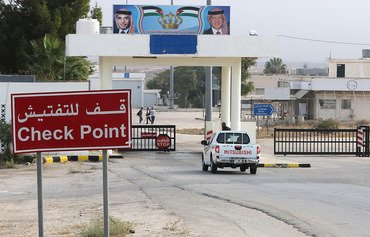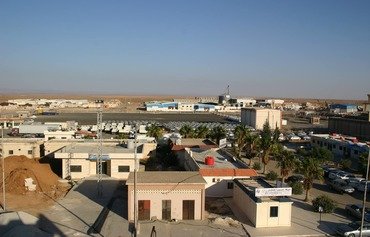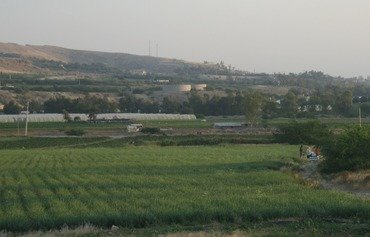Lebanese farmers have welcomed the reopening on Monday (October 15th) of the main border crossing between Jordan and Syria after more than three years.
The Jaber crossing, known as Nassib on the Syrian side, was a key route for Middle East trade before Jordan closed the post in 2015 after it was overrun by opposition fighters.
With the reopening of the Nassib-Jaber crossing, Lebanese farmers will once again be able to transport agricultural and manufactured products to Arab and Gulf markets by land, which is cheaper than shipping them by sea.
Lebanese President Michel Aoun on Monday hailed the reopening of the crossing, describing it as beneficial for Lebanon’s production sector, Naharnet reported.
"Opening of the Nassib border crossing is beneficial because it will reconnect Lebanon to Arab countries and allow the passage of people and merchants from Lebanon to Arab countries, and vice versa," he said in a social media post.
The reopening of the crossing "will revive Lebanon’s various production sectors, and will reduce the cost of exports to Arab countries", he added.
Vital artery for agricultural exports
Reopening the Nassib-Jaber crossing was a matter of urgency for all farmers, said Bekaa Farmers Association president Ibrahim Tarshishi.
"It is a vital artery for our agricultural exports," he told Al-Mashareq.
Tarshishi said he received word from General Directorate of General Security director-general Maj. Gen. Abbas Ibrahim that as of Tuesday morning, Lebanese trucks carrying produce could resume operations on the land route.
This route takes them through Nassib crossing and onward to other countries in the region, he said, adding that he was asked to circulate the news among all farmers who seek to export produce through the border crossing.
The crossing's reopening "coincides with the harvest season for many agricultural and fruit crops, and exporting them by land is of high importance to us because it saves time and shipping costs", he said.
"Before its closure, we exported 70% of our agricultural production, 32% of our manufactured food products and 22% of our manufactured industry products to Gulf countries through the Nassib crossing," Tarshishi said.
Added time and cost of shipping
After the crossing closed, Lebanese farmers were forced to export their produce by sea, which "takes between 15 and 20 days", Tarshishi said.
In addition to the extra time, the cost of shipping by sea was high, he said, even though it was subsidised by the state, which covered the difference in cost to the tune of more than 25 billion Lebanese pounds ($16.5 million).
The closure of the Nassib crossing "caused us to incur $1.2 billion in losses annually", Tarshishi said.
While an annual 550,000 tonnes of Lebanese agricultural exports had passed through Nassib crossing prior to its closure, he said, no more than 350,000 tonnes have been shipped by sea each year since.
The crossing is a necessity for the agricultural, manufacturing, commercial, tourism and land transport sectors, he said, noting that all Lebanese, Syrian and Jordanian citizens benefit from it.
According to George Sakr, president of the Bekaa Potato Farmers Association, Lebanon "produces between 400,000 and 450,000 tonnes of potatoes annually in the Bekaa and Akkar combined".
These used to be exported to Arab and Gulf markets through the Nassib crossing.
"The cost of exporting through the crossing ranges between $1,500 and $2,000 per truck," he told Al-Mashareq, noting that while the crossing was closed, farmers paid $4,000 per container shipped by sea, and it took longer.
Reopening will stem sector's losses
"Since 2014, we have incurred heavy losses due to the closure of the crossing," he said, noting that farmers have been forced to sell produce at a loss.
The reopening of the crossing to Lebanese trucks "will cut the losses incurred by the land transport sector and the agricultural, manufacturing and commercial sectors", said Omar al-Ali, head of the syndicate of the owners of refrigerator trucks.
There used to be 1,350 refrigerated and 2,000 non-refrigerated trucks, all of which operated on the export route through the Nassib crossing, he told Al-Mashareq.
He noted that 300 Lebanese drivers out of the previous 1,350 are ready to pass through the Nassib crossing to deliver seasonal fruits to Jordan and other Arab markets.
"As soon as the crossing is operational, the agricultural and industrial sector will recover," he predicted.

![Trucks transport containers to the port of Beirut to export agricultural products by sea. The reopening of Nassib crossing will enable Lebanese farmers to resume regional exports via the land route. [Nohad Topalian/Al-Mashareq]](/cnmi_am/images/2018/10/17/14943-Lebanon-Beirut-trucks-600_384.jpg)






